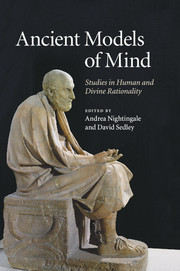Book contents
- Frontmatter
- Contents
- List of contributors
- Introduction
- 1 Plato on aporia and self-knowledge
- 2 Cross-examining happiness: reason and community in Plato's Socratic dialogues
- 3 Inspiration, recollection, and mimēsis in Plato's Phaedrus
- 4 Plato's Theaetetus as an ethical dialogue
- 5 Contemplating divine mind
- 6 Aristotle and the history of skepticism
- 7 Stoic selection: objects, actions, and agents
- 8 Beauty and its relation to goodness in Stoicism
- 9 How dialectical was Stoic dialectic?
- 10 Socrates speaks in Seneca, De vita beata 24–28
- 11 Seneca's Platonism: the soul and its divine origin
- 12 The status of the individual in Plotinus
- A. A. Long: publications 1963–2009
- Bibliography
- Index
11 - Seneca's Platonism: the soul and its divine origin
Published online by Cambridge University Press: 06 December 2010
- Frontmatter
- Contents
- List of contributors
- Introduction
- 1 Plato on aporia and self-knowledge
- 2 Cross-examining happiness: reason and community in Plato's Socratic dialogues
- 3 Inspiration, recollection, and mimēsis in Plato's Phaedrus
- 4 Plato's Theaetetus as an ethical dialogue
- 5 Contemplating divine mind
- 6 Aristotle and the history of skepticism
- 7 Stoic selection: objects, actions, and agents
- 8 Beauty and its relation to goodness in Stoicism
- 9 How dialectical was Stoic dialectic?
- 10 Socrates speaks in Seneca, De vita beata 24–28
- 11 Seneca's Platonism: the soul and its divine origin
- 12 The status of the individual in Plotinus
- A. A. Long: publications 1963–2009
- Bibliography
- Index
Summary
To Tony, demiurge and providence
At the opening of the Didaskalikos, Alcinous – if in fact he is the author – provides two definitions of wisdom: first, that “it is the knowledge of divine and human matters”; second, that it entails “a loosening of the soul and turning away from the body.” The first definition is also attested for the Stoics. The second definition, inspired by Plato's Phaedo, would seem a particularly good fit in a Middle Platonist context, such as Alcinous' handbook, because it emphasizes a stark and unmitigated dualism between the intelligible and sensible realms. Precisely for that reason one would not expect such a definition to show up in a Stoic context, since Stoicism is an implicit target of criticism in Alcinous' account. Yet Seneca seems to have been quite attracted to this second view of wisdom and philosophy, and his texts are interspersed with echoes of the theme. But for all his attraction to the Phaedo and to other Platonic accounts, Seneca remains quite rooted in Stoic thought, even if he finds himself dreaming, on occasion, of immortality (Ep. 102). To get this point across, one does not need to explain away certain passages of Seneca as mere metaphors, or rhetoric in the service of practical, moral philosophy. From a hermeneutical point of view such an approach is unsatisfactory because, for one thing, it does not address the question why Seneca chooses certain metaphors or rhetorical devices over others.
- Type
- Chapter
- Information
- Ancient Models of MindStudies in Human and Divine Rationality, pp. 196 - 215Publisher: Cambridge University PressPrint publication year: 2010
- 2
- Cited by



